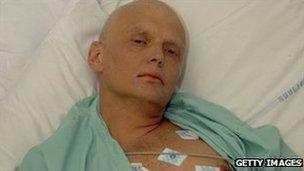Alexander Litvinenko inquest 'may look at MI6 role'
- Published

The inquest into the death of murdered Russian former spy Alexander Litvinenko could examine the possible role of British spies in his death.
MI6 and the Russian secret service, the FSB, may become "interested parties", a pre-inquest review has heard.
The inquest is set to be held as soon as possible next year.
Mr Litvinenko, 43, is thought to have been poisoned with polonium-210 after meeting two Russians for tea at a central London hotel in November 2006.
The pre-inquest review was held on Friday at Camden Town Hall, in north London.
Hugh Davies, counsel to the inquest, said it could extend to include "the possible culpability of the Russian state", as well as "the possible culpability of the British state in the death of Alexander Litvinenko either: one, in carrying out by itself or its agents the poisoning; or two, failing to take reasonable steps to protect Mr Litvinenko from a real and immediate risk to his life".
He said the Russian state has been invited since January to become an interested party in the inquest, although the offer had not yet been taken up.
The BBC's Gordon Corera said interested party status would mean its representatives would be able to cross-examine witnesses and examine documents.
Controversial theories
Mr Davies told the hearing there were a "number of competing and increasingly controversial theories" surrounding Mr Litvinenko's death.
He said the inquest's scope could include involvement of other parties, including his friend Boris Berezovsky, Chechen-related groups and the Spanish mafia.
Maya Sikand, for Mr Litvinenko's widow Marina, said if the Russian state could not become an interested party, it was possible the FSB could.
"It may be that what should also be considered is whether MI6 should be invited to either apply or be so designated," she added.
She said while the suggestions Mr Litvinenko may have committed suicide or died in an accident were "distasteful" to his widow, and there was "not a shred of evidence" to support them, Mrs Litvinenko was prepared to see the theories examined at the inquest.
Speaking after the hearing, Mrs Litvinenko said she hoped to end speculation surrounding her husband's death.
"I believe it is important, not just for me and my family and my friends, it's important for the two countries," she said.
"It's important for Russia and England because this relationship is quite difficult and I think everybody needs to know what happened to Sacha [Mr Litvinenko].
"I would just like to know the truth because I want to stop all speculation.
"The most difficult thing to me was of course listening about an accident and suicide, and I want to stop it."
At the review it also emerged that certain British government departments have not yet handed over material relevant to the inquest which was requested in January.
Neil Garnham QC, representing the Home Office, said departments asked for information were the Atomic Weapons Establishment, the Cabinet Office, Home Office, Foreign Office, Health Protection Agency, the Ministry of Defence, intelligence and security agencies, and the Serious Organised Crime Agency.
Each had started searching for relevant material and expect to hand it over within weeks, he said.
- Published21 January 2016
- Published20 September 2012
- Published12 September 2011
- Published8 September 2011